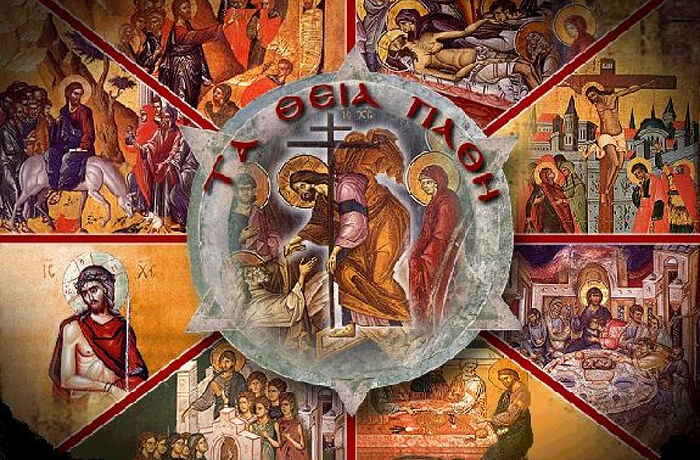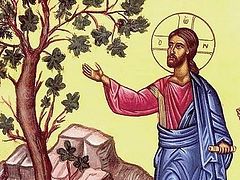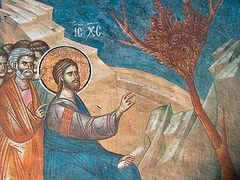Holy Week has dawned, the week of Christ’s sublime and august Passion. Come lovers of the feasts, let us meet it in song! With these words, last night at Bridegroom Matins, the Holy Church initiated the annual observance of the Sacred Passion of Christ. I will confess to you that no other time of the year is etched into my soul as Holy Week. The complexity of the hymnody, the somber decorations of the church or monastery, the cleanliness which took place the week prior—the “Week of the Deaf”, as the Greeks call it, since no “Salutations” to the Mother of God were heard, in stark contrast to the previous Lenten weeks. Anticipation fills the air. The house smelled of mahlépi, tsourékia, with hymnody from the Passion week services on the radio filling the silence of the days leading up to Palm Sunday. These are the memories I have. The atmosphere, as I said, was of anticipation: anticipation of the coming of the eternal Bridegroom. After the festal services of Palm Sunday, we would return and eat the traditional salted cod with the skordaliá—and at night, we would go to the Bridegroom. Perhaps no service—year in and year out, through my recollections which span the better part of two decades—made such an impression on my childhood self as this. Whether we attended it at the local parish where the (now reposed) sacristan would chant, whispering along with the chanters, inaudibly, the hymn Behold the Bridegroom comes in the middle of the night, or at the monastery, where the serving priest would bring forth the icon of Christ the Bridegroom during the chanting of the aforementioned hymn under the lit and swinging chandelier… This was indeed for me, in the words of Papadiamantis—though at the time I could not articulate it—the springtime of the soul. This is what Orthodox Holy Week is: the soul’s springtime. And Passion Week became a centrifugal reference point of my spiritual life. I do not exaggerate when I say that the popular piety of the Greeks as reflected in the Holy Week observances permanently influenced my spirituality, assuring me of the eternal truth of the Orthodox Faith as opposed to the other Christian confessions. Whatever happened, whatever negative experiences I faced (especially in my time in the Constantinople Patriarchate as a priest), no matter what temptations of cynicism I faced, it was this primitive, childhood faith that called me back. The timeless nature and spirit of the Holy Week services, which spring forth from the piety of my ancestors, and their expression, their regeneration of Christ’s Passion that spanned every generation (Matins, Holy Saturday), their assurance of the Victory of the Cross, and the heartfelt, intrinsic knowledge that death is dealt an eternal defeat.
Timelessness. The moment when time itself ceases to exist. The days are called Great not because more hours are added to them but because eternal, cosmic, altering events took place within them that had an impact on the fate of mankind. Events that are full of human passions, suffering, betrayal, evil, mockery, jealousy, lies, and conspiracy. Events that expose the utter sewage that is the soul of man when he betrays himself to licentiousness. Yet where there is a Judas, there is also a prostitute who is redeemed, and whose sacrificial act guarantees the preservation of her memory wherever this Gospel is preached to the end of time. While Apostles deny Him and scatter, weak women keep vigil under His Cross.
We began with Bridegroom Matins; I recounted certain observations and reminisces of my childhood years, and I end by giving a succinct synopsis of Holy Week. What is the constant thread here? That in Holy Week, our lives are consumed by the Passion of Christ. Our focus is on the mystery of His eternal sacrifice. Through which you and I were ransomed from death, though slaves to sin. I began by narrating my reminisces of the Bridegroom service of Holy Monday, which is chanted throughout Orthodoxy on Palm Sunday evening; and now, concerning the present narration, this is where I return.
After the reading of the Six Psalms, the magnificent Lenten Alleluia is chanted with the profound verses, Out of the night my soul rises early to Thee, O God, thy commandments are a light on the earth.... learn righteousness you inhabitants of the earth. Oh! How the eternal voice of the Bridegroom Christ echoes to us through David, the Prophet-King. Blessed is the servant whom the Bridegroom shall find watching! How we slumber in idleness and laziness! Cursed is the soul who stands idly in the café, watching TV, or in some other pastime, as the village priest in black vestments carries Christ the Bridegroom in procession around the temple during the singing of this soul-stirring hymn; our pious grandmothers, holding candles and kneeling, weeping as the Bridegroom passes by. Unworthy is the servant whom the Bridegroom shall find headless. Beware, my soul, lest thou be given unto death, and be shut out of the kingdom! The Bridegroom silently led to the slaughter invites each man who enters the world to hear His eternal voice. It is on each person’s conscience how he will answer the Bridegroom. The invisible King appears on earth and has come to accept condemnation on the Cross by lawless men. By this, our condemnation has been condemned in His Passion. How each one will react to this salvific event, which intimately concerns his eternal fate, is within his own control. What can we offer the eternal Bridegroom? The flowers of the field around His icon, a beeswax candle, a tear shed as the soul internalizes the solemn mystery of which the choir sings: Beware my soul, do not be caught in sleep!
Christ, in the Gospel we heard last night at the Matins of Holy Monday, is absolutely clear: Those who do not bring forth fruit incur the curse of the Fig Tree. What spiritual fruit can I bring to the Bridegroom? I must bring the fruits of my repentance, of my contrite heart, my broken spirit, my genuine confession, my flaming love. I must bring the fruits of humility. Jesus was humble and submitted to the death of a condemned slave, though He is the Author of All, the Creator of the Universe, the One who holds life in His hand. And Joseph the Comely, the Patriarch of whom we heard extensively in the Bridegroom Matins last night, is a prefigurement of Christ. Unjustly condemned and sold by his brethren out of jealousy and envy, his father’s favorite son, he meekly submitted to his fate. God, in His infinite wisdom having given him the strength to conquer the temptation of lust, eventually set Him as Lord over Egypt. And Joseph became the future redeemer and benefactor of His people—even His brethren and his father’s house. God grants his servants an incorruptible crown, the Holy Church sings during the Matins of Holy Monday at the Kontakion in reference to Joseph. What shall I do, then? Who will I imitate: the cursed Fig Tree, or the humble Joseph?
Israel’s domination of Egypt eventually became a captivity, which signifies the overall captivity of humanity to death. And Christ, as another Moses, leads Israel—the new, redeemed humanity, redeemed in the waters of baptism and the sacred Mysteries—to life. This sentiment is reflected in the Eirmos of the First Ode of Holy Monday’s Matins. Humility is the theme of this three-canticled canon. It is the crux, the very essence of Holy Week. God, having become Man, appearing to us in the form of servant, now submits to death. Submitting to the voluntary Passion He instructs us saying, Tyranny has no part with Me nor does arbitrariness. Whoever would be great among you and first, let him be least and servant of all the others. Take this example from me. He assures us: We will drink of the cup He drinks of—the cup of suffering and humility and even death. We cannot have the presumption which the Mother of Zebedees’ sons had as she dared ask Christ to give her children temporal glory! I have come, said Christ, in answer to the mother of James and John, to accept poverty—so do likewise. I have come to be the least. I have come to pour water in a basin and to wash feet. To impart myself, my Body and Blood to a treacherous, scheming disciple. To be denied by those closest to me. And finally, to die an excruciating death amidst temptation, mockery, and abandonment. This is the lofty humility which we Christians are commanded to attain. Perhaps, in the silence of these solemn nights, you too will kneel before the Bridegroom Christ and submit the pains and repentance of your heart to Him who knows the secrets of men. Perhaps, you will also hear His sweet, eternal voice addressing you with the words He addressed to the Apostles: No longer do I go to the earthly Jerusalem to suffer, but to my Father and to your Father, and to my God and your God. And I will raise you up to the Jerusalem on High, to the Kingdom of Heaven.




